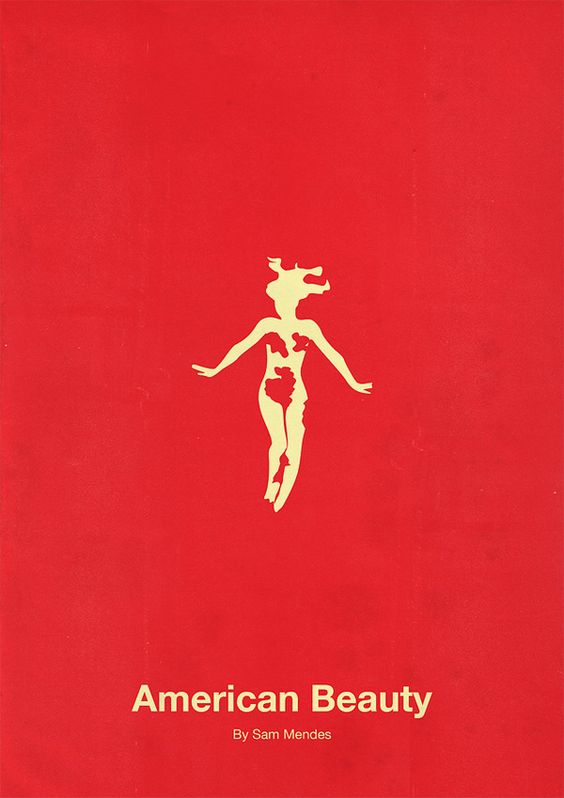by KEM Huntley
“Welcome to America’s Weirdest Home Videos”—an apt line from American Beauty, director Sam Mendes and screenwriter Alan Ball’s stark art set piece of individual torment and family calamity. Familiar familial territory immediately reminiscent of Ordinary People and The Ice Storm (films that influenced Mendes, Premiere 10/99), American Beauty is a Dramatica grand argument story that compels us to “look closer” at pain and mundane, and life will reveal the spectacular.
INANITY
Main character Lester Burnham recounts in voice-over: “I’m forty-two-years old. In less than a year, I’ll be dead. In a way, I’m dead already. . . Both my wife and daughter think I’m this gigantic loser (overall story problem-perception). And they’re right (main character problem-perception). I’ve lost something very important. I’m not exactly sure what it is, but I know I didn’t always feel this . . . sedated (main character focus-inertia). But you know what? It’s never too late to get it back” (main character growth-start).
At Lester’s ad agency, it has been decided (overall story driver) that: “. . . everyone write a job description, mapping out in detail how they contribute. That way, management can assess who’s valuable and who’s ‘expendable'” (overall story concern conceptualizing). Lester objects (main character approach-do-er) to this “fascist” order (overall story focus), Wife Carolyn, a study in glacial ambition, asserts: “There is no decision. Just write the damn thing! . . . you don’t want to be unemployed” (overall story direction-chaos).
Lester sulkily attends daughter Jane’s high school dance performance with Carolyn: “What makes you so sure she wants us to be there? Did she ask us to come? . . . I’m missing the James Bond marathon on TNT.”
Jane’s best friend and fellow “Dancing Pantherette” Angela Hayes (allusion to Nabokov’s Lolita Haze?) catapults Lester out of his malaise: “I feel like I’ve been in a coma for about twenty years (main character concern-past), and I’m just now waking up” (main character growth-start), priming him for impact character Ricky Fitts.
Apathetically escorting Carolyn to a realtor’s function: “Lester, listen to me. This is important . . . as you know, my business is selling an image (overall story problem-perception) . . . do me a favor and act happy” (overall story benchmark-being). Lester is approached by Ricky, a waiter in the hotel:
RICKY
I’m Ricky Fitts. I just moved into the house next to you . . . Hey, do you
party? (relationship story concern-doing).
LESTER
I’m sorry?
RICKY
Do you get high?
Lester’s surprised, but instantly intrigued . . . Ricky and Lester stand next to a dumpster behind the service entrance to the hotel, smoking a JOINT (relationship story thematic issue-senses) . . . Suddenly . . . a serious young MAN in a cheap suit peers out at them. Ricky hides the joint.
MAN
(to Ricky)
Look. I’m not paying you to . . . (eyes Lester suspiciously) . . . do whatever it is you’re doing out here (relationship story catalyst-interpretation).
RICKY
Fine. Don’t pay me . . . I quit (impact character driver-change). Now, leave me alone.
LESTER
I think you just became my personal hero (relationship story concern-understanding).
Doesn’t that make you nervous, just quitting your job like that?
RICKY
. . . I just do these gigs every now and then as a cover. . . But my dad (impact character domain-mind) interferes
a lot less in my life when I pretend (overall story benchmark-being) to
be an upstanding young citizen with a respectable job (overall story problem-perception).
Like all the objective characters in American Beauty, Ricky has his own agenda (overall story domain-psychology). Taking Jane in with an ardent video gaze, he is captivated:
JANE
What is it?
ANGELA
It’s that psycho next door. . .
JANE
I bet he’s filming us right now.
Voyeurism and exhibitionism loop, as through the camera lens Ricky seeks out Jane from his bedroom window:
On VIDEO: We’re across from Jane’s window, peering in. Jane tries to shut the drapes, but Angela won’t let her. Irritated, Jane retreats into the room. We ZOOM toward her, even as Angela poses in the window, waving, but we’re clearly not interested in Angela. The ZOOM continues, searching for Jane . . . Finally, we settle on the full-length MIRROR on the open closet door, where we see a REFLECTION of Jane . . . She’s smiling.
Lester continues to be directed by change: “It’s a great thing to realize you still have the ability to surprise yourself. Makes you wonder what else you can do that you’ve forgotten about . . .”
He meets Ricky’s father, Colonel Frank Fitts, U.S. Marine Corps, a man locked in a perpetual vise grip of impotent rage, and always suspicious (impact character thematic counterpoint) of what goes on in his son’s life. Immoral and/or illegal:
RICKY
. . . G-13 . . . genetically engineered by the U.S. Government. Extremely
potent. But a completely mellow high, no paranoia. . . Two grand.
LESTER
. . . Well, now I know how you can afford all this equipment. When I was your
age, I worked at McDonald’s all summer just to buy an eight track. . . it was probably the best time of my life (main character concern-past).
RICKY
My dad thinks I paid for all this with catering jobs.
Never underestimate the power of denial (overall story inhibitor-senses).
Lester and Carolyn’s marriage is another relationship on trial:
CAROLYN
This is not a marriage.
LESTER
This hasn’t been a marriage for years. But you were perfectly happy as long as
I kept my mouth shut. Well, guess what? I’ve changed (main character direction).
The vicissitudes include Lester quitting his job (after blackmailing his boss for a sweet severance package), hiring on at a fast food restaurant, and indulging in adolescent fantasies (overall story dividend-the past). Incensed, Carolyn relieves her stress by bopping Leonard Kane-The Real Estate King-and obsessively shooting a “Glock 19” automatic revolver at the local firing range.
Ricky confides his fierce obsession to Jane: “I knew there was this entire life behind things, and . . . this incredibly benevolent force, that wanted me to know there was no reason to be afraid. Ever. Video’s a poor excuse. But it helps remember . . . and I need to remember . . .” (impact character concern-memory.
Ricky must recall all instances of beauty to survive as the only child of a desensitized (overall story inhibitor-senses) mother and militaristic father:
COLONEL
You need structure, you need discipline (impact character focus-order).
INSANITY
Ultimately, the fairytale of an American family (overall story goal-conceptualizing) fractures(outcome-failure):
LESTER
Remember those posters that said, “Today is the first day of the rest of
your life.” Well, that’s true of
every day except one. The day you die.
A day of cataclysmic decisions.
Colonel Fitts misinterprets (relationship story thematic counterpoint) the relationship between Lester and Ricky as homosexual. An avowed homophobic, he brutally evicts his son from their home. The Colonel is only repressing his own feelings (overall story solution-actuality). Unpredictably (main character thematic issue) he kisses Lester on the mouth. Lester compassionately rebuffs his advances, unaware of the impossible circumstances (overall story catalyst) in which the Colonel now (overall story forewarnings-present) finds himself.
Ricky asks Jane to run away with him:
RICKY
If I had to leave tonight, would you come with me? If I went to New York. To
live. Tonight. Would you come with me?
JANE
Yes.
Angela, alienated from Jane and Ricky, is determined to follow through with her seductive promise to Lester. Until:
ANGELA
This is my first time (overall story
solution-actuality).
Reality check (main character solution-actuality). Lester decides not to deflower this American beauty (main character resolve-change).
Morality gives way to mortality. The Colonel silently returns and takes a gun to Lester. Carolyn, arriving on the scene, gathers Lester’s empty suits in her arms, understanding (overall story consequence) the husband she so contemptuously dismissed, is really gone (limit-optionlock).
HUMANITY
Lester takes his demise philosophically:
LESTER
. . . it’s hard to stay mad when there’s so much beauty in the world. Sometimes
I feel like I’m seeing it all at once (main character mental
sex-female), and it’s too much, my heart fills up like a balloon
that’s about to burst . . . and then I remember to relax, and stop trying to
hold on to it, and then it flows through me like rain and I can’t feel anything
but gratitude for every single moment (main character judgement-good) of
my stupid little life . . .
A life of artifice and the ordinary redeemed by an appreciation for the extraordinary.
NOTE: Since the time of this article’s publication, it has been determined that the storyform presented above was inaccurate in regard to one key story point: the Main Character’s Problem-Solving Style (now Linear).

